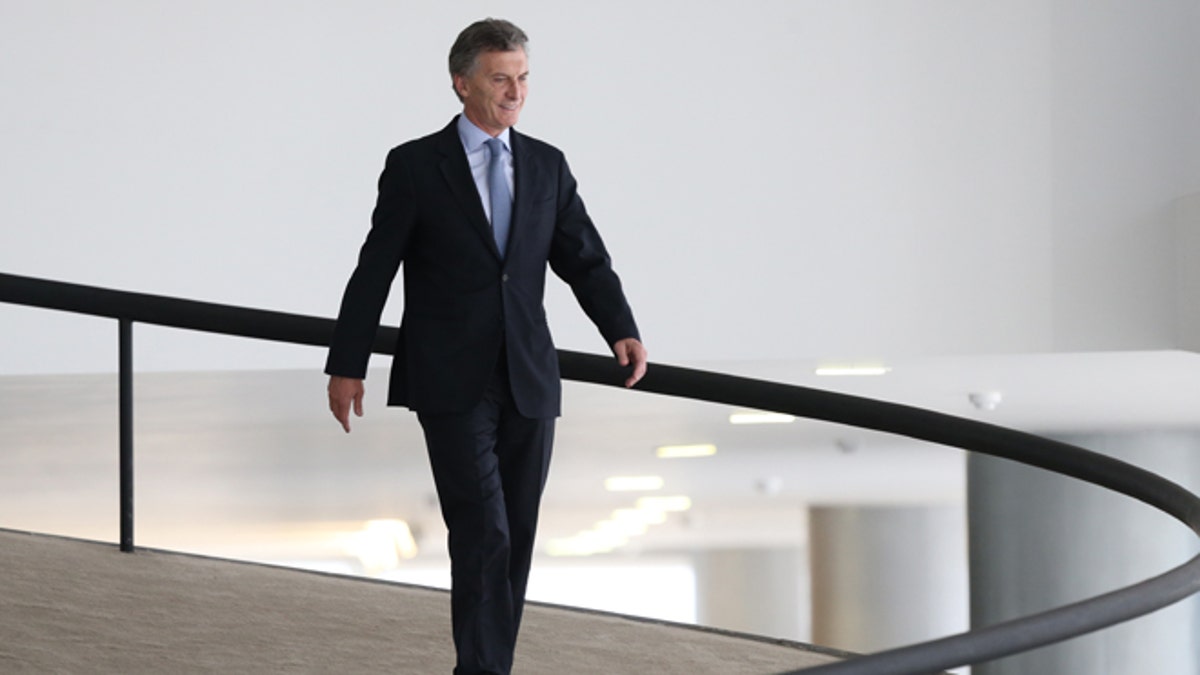
In this Friday, Dec. 4, 2015 photo, Argentina's President-elect Mauricio Macri walks down an inner ramp of the Planalto Presidential Palace, after meeting with Brazils President Dilma Rousseff, in Brasilia, Brazil. Macri, who won a presidential runoff election over the ruling party candidate in late November, is making his first official state visit as the next leader of Argentina. (AP Photo/Eraldo Peres)
Buenos Aires, Argentina (AP) – After 12 years of often divisive rule and heavy spending on social welfare programs, Argentina's president-elect promises to usher in an era of more civil discourse and roll back much of the spending that many economists say has brought the South American nation to the brink of crisis.
President-elect Mauricio Macri will be sworn in Thursday after defeating the chosen successor of outgoing President Cristina Fernández during last month's election. Macri ran on free-market ideas, promising to overhaul a struggling economy and be a leader "who listens more and talks less," a clear dig at Fernández, who frequently blasted opponents during hours-long speeches.
Fernández, and before her late husband and predecessor, Néstor Kirchner, dominated Argentina's political landscape for the last 12 years. The power couple sharply increased spending on social welfare programs while raising tariffs in attempts to protect local industries and aligning the country with leftist leaders like late Venezuelan President Hugo Chávez and Bolivian President Evo Morales.
Macri has promised to undo many of those policies and improve relations with the United States. While his election victory represented a seismic change in Argentine politics, enacting his reforms will prove difficult.
On Thursday, he inherit myriad problems: Inflation around 30 percent, dangerously low foreign reserves for the third largest economy in Latin America and a long-time spat with a group of creditors in the U.S. that has kept Argentina on the margins of international credit markets.
Macri will also be wedged in by campaign promises to lift restrictions on buying U.S. dollars, and thus eliminate a booming black market that has made it difficult for local businesses to operate. The lifting of restrictions will likely lead to a devaluation of the Argentine peso, a scary proposition in a country that defaulted on $100 billion in debt during a 2001-2002 financial crisis that plunged half the country into poverty.
Macri will have to maneuver without ruling majorities in either chamber. However, his party will control both the city of Buenos Aires and the vast Buenos Aires province, where 40 percent of the country's 41 million people live.
He will also have to work to win over a polarized electorate and Fernández has made clear she will be a stiff opposition opponent.
In recent weeks, she has rushed dozens of bills through Congress, appointed ambassadors and many other public workers and cut some taxes on the provinces, which will all make Macri's initial months more difficult.
She has also decided not to attend Thursday's inauguration ceremony after she and Macri bickered for weeks about logistical details. Macri wanted to receive the presidential baton and sash from Fernández in the government house, or Casa Rosada. However, Fernández insisted that Macri receive them in Congress.
The tiff, which had many Argentines shaking their head in shame, ended on Tuesday when a top aide said the president simply wouldn't attend.
